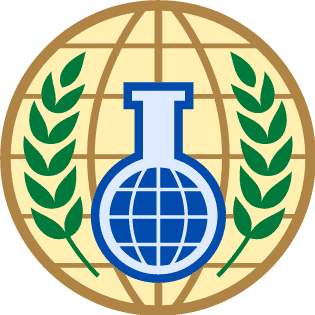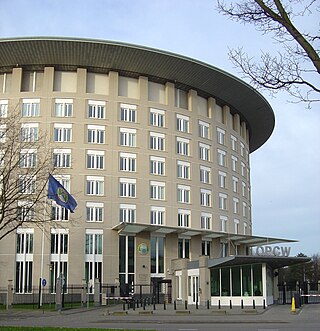
The Organisation for the Prohibition of Chemical Weapons (OPCW) is an intergovernmental organisation and the implementing body for the Chemical Weapons Convention (CWC), which entered into force on 29 April 1997. The OPCW, with its 193 member states, has its seat in The Hague, Netherlands; it oversees the global endeavour for the permanent and verifiable elimination of chemical weapons.

The Chemical Weapons Convention (CWC), officially the Convention on the Prohibition of the Development, Production, Stockpiling and Use of Chemical Weapons and on their Destruction, is an arms control treaty administered by the Organisation for the Prohibition of Chemical Weapons (OPCW), an intergovernmental organization based in The Hague, The Netherlands. The treaty entered into force on 29 April 1997. It prohibits the use of chemical weapons, and the large-scale development, production, stockpiling, or transfer of chemical weapons or their precursors, except for very limited purposes. The main obligation of member states under the convention is to effect this prohibition, as well as the destruction of all current chemical weapons. All destruction activities must take place under OPCW verification.

Syria and weapons of mass destruction deals with the research, manufacture, stockpiling and alleged use by Syria of weapons of mass destruction, which include chemical and nuclear weapons.

The 2013 Nobel Peace Prize was awarded to the Organisation for the Prohibition of Chemical Weapons for their "extensive work to eliminate chemical weapons". The award citation indicated the organization was awarded the prize, because they "have defined the use of chemical weapons as taboo under international law. Recent events in Syria, where chemical weapons have again been put to use, have underlined the need to enhance the efforts to do away with such weapons." The committee criticized Russia and the United States for not meeting the extended deadline for destruction of its chemical weapons, and noted that certain countries "are still not members". The OPCW was the 22nd organization to be awarded the prize.
There have been several instances of chemical weapons attacks during the Syrian Civil War, beginning in 2012, which were corroborated by national governments, the United Nations (UN), the Organisation for the Prohibition of Chemical Weapons (OPCW), Human Rights Watch (HRW), international organizations and media outlets.
The Khan al-Assal chemical attack was a chemical attack in Khan al-Assal, Aleppo, Syria on 19 March 2013, which according to the Syrian Observatory for Human Rights resulted in at least 26 fatalities including 16 government soldiers and 10 civilians, and more than 86 injuries. Immediately after the incident, the Syrian government and opposition accused each other of carrying out the attack, but neither side presented clear documentation. The Syrian government asked the United Nations to investigate the incident, but disputes over the scope of that investigation led to lengthy delays. In the interim, the Syrian government invited Russia to send specialists to investigate the incident. Samples taken at the site led them to conclude that the attack involved the use of sarin, which matched the assessment made by the United States. Russia held the opposition responsible for the attack, while the US held the government responsible. UN investigators finally arrived on the ground in Syria in August, but their arrival coincided with the much larger-scale 2013 Ghouta attacks which took place on 21 August, pushing the Khan al-Assal investigation "onto the backburner" according to a UN spokesman. The UN report, which was completed on 12 December, found "likely use of chemical weapons in Khan al-Assal" and assessed that organophosphate poisoning was the cause of the "mass intoxication".

The destruction of Syria's chemical weapons began on 14 September 2013 after Syria entered into several international agreements which called for the elimination of Syria's chemical weapon stockpiles and set a destruction deadline of 30 June 2014. Also on 14 September 2013, Syria acceded to the Chemical Weapons Convention (CWC) and agreed to its provisional application pending its entry into force on 14 October. Having acceded to the CWC, the Organisation for the Prohibition of Chemical Weapons (OPCW) Executive Council on 27 September approved a detailed implementation plan that required Syria to assume responsibility for and follow a timeline for the destruction of Syrian chemical weapons and Syrian chemical weapon production facilities. Following the signing of the Framework Agreement on 14 September 2013 and after the OPCW implementation plan, on 27 September the United Nations Security Council unanimously adopted Resolution 2118 which bound Syria to the timetable set out in the OPCW implementation plan. The joint OPCW-UN mission was established to oversee the implementation of the destruction program.

United Nations Security Council Resolution 2118 was adopted unanimously on 27 September 2013, in regard to the Framework for Elimination of Syrian Chemical Weapons during the Syrian civil war. It recalled United Nations Security Council Resolutions 1540, 2042 and 2043 and occurred on the sidelines of the General debate of the sixty-eighth session of the United Nations General Assembly. Under the Resolution, Syria had until mid-2014 to destroy its chemical weapons arsenal; and the Resolution also outlines plans for a transition. Despite a few hiccups, the OPCW reported that the destruction was largely on schedule.
The OPCW-UN Joint Mission in Syria was jointly established on 16 October 2013 by the Organisation for the Prohibition of Chemical Weapons (OPCW) and the United Nations (UN) to oversee the elimination of the Syrian chemical weapons program. The Joint Mission continued the work of the OPCW-UN advance team that had arrived in Damascus on 1 October 2013.
The United Nations Mission to Investigate Allegations of the Use of Chemical Weapons in the Syrian Arab Republic was a United Nations fact-finding mission to investigate possible use of chemical weapons in Syria. The mission was established by the U.N. Secretary-general Ban Ki-moon on 21 March 2013 to investigate the 19 March 2013 Khan al-Assal chemical attack that was brought to the Secretary-general's attention by the Syrian Government. On 27 March 2013, the secretary-general appointed Åke Sellström to head the mission. The mission had an OPCW component headed by Scott Cairns and a WHO component headed by Maurizio Barbeschi.
The OPCW Fact-Finding Mission in Syria is a mission of the Organisation for the Prohibition of Chemical Weapons (OPCW) to investigate some possible cases of the use of toxic chemicals in Syria during the civil war, including chlorine. The 21 August 2013 Ghouta chemical attack used sarin. The OPCW-Director General Ahmet Üzümcü announced the creation of the mission on 29 April 2014. This initial mission was headed by Malik Ellahi. The Syrian Government agreed to the Mission.
The United Nations Security Council adopted United Nations Security Council resolution 2235 (2015) on 7 August 2015, in response to use of chemical weapons in the Syrian Civil War. The resolution condemned "any use of any toxic chemical, such as chlorine, as a weapon in the Syrian Arab Republic" and expressed determination to identify and hold accountable those responsible for such acts. The resolution established a Joint Investigative Mechanism (JIM), a partnership between the United Nations (UN) and the Organisation for the Prohibition of Chemical Weapons (OPCW). The Security Council renewed the JIM's mandate in resolution 2319 (2016) on 17 November 2016, for a further period of one year.
The Khan Shaykhun chemical attack took place on 4 April 2017 on the town of Khan Shaykhun in the Idlib Governorate of Syria. The town was reported to have been struck by an airstrike by government forces followed by massive civilian chemical poisoning. The release of a toxic gas, which included sarin, or a similar substance, killed at least 89 people and injured more than 541, according to the opposition Idlib Health Directorate. The attack was the deadliest use of chemical weapons in the Syrian civil war since the Ghouta chemical attack in 2013.
The Talmenes chemical attack took place on 21 April 2014, in the village of Talmenes in Idlib Governorate of Syria. The village was struck by a chemical attack around 10:30 when two “barrel bombs” embedded with cylinders of chlorine gas reportedly were dropped on the village. The bombs struck two houses some 100 m from each other, in the neighbourhood around the “big” mosque. According to Human Rights Watch, the attack killed three civilians and wounded about 133.
The Sarmin chemical attack was a chlorine attack that took place on 16 March 2015, in the village of Sarmin in the Idlib Governorate of Syria.
The Saraqib chemical attack is an alleged attack that was reported to take place in Saraqib in Idlib Governorate in Syria on 29 April 2013. A further attack occurred in February 2018, during which, according to the United Nations Organisation for the Prohibition of Chemical Weapons (OPCW) Investigation and Identification Team (IIT), “at least one cylinder” of chlorine gas was dropped, spreading “over a large area” and affecting at least 12 Syrians on the ground. The IIT attributed the attack to Syrian government military, specifically the Syrian Arab Army's Tiger Forces.
On 7 April 2018, a chemical warfare attack was launched by the forces of the government of Bashar al-Assad in the city of Douma, Syria. Medics and witnesses reported that it caused the deaths of between 40 and 50 people and injuries to possibly well over 100. The attack was attributed to the Syrian Army by rebel forces in Douma, and by the United States, British, and French governments. A two-year long investigation by the Organisation for the Prohibition of Chemical Weapons (OPCW) Investigation and Identification Team (IIT) concluded in January 2023 that the Syrian Air Force perpetrated the chemical attacks during its military campaign in Douma. On 14 April 2018, the United States, France and the United Kingdom carried out a series of military strikes against multiple government sites in Syria.

On 14 April 2018, beginning at 04:00 Syrian time (UTC+3), the United States, France, and the United Kingdom carried out a series of military strikes involving aircraft and ship-based missiles against multiple government sites in Syria during the Syrian Civil War. The strikes were a reprisal for the Douma chemical attack against civilians on 7 April, widely attributed to the Syrian government. The Syrian government called the airstrikes a violation of international law.

The Barzah scientific research centre, also known as the Barzah Scientific Research Facility or Institute 2000 was a facility of the Syrian Scientific Studies and Research Center located in Barzeh, Damascus. Several buildings at the centre alleged to be associated with a Syrian chemical weapons programme were destroyed during the 2018 missile strikes against Syria during the Syrian Civil War. Other buildings within the larger complex were undamaged.
The United Nations Secretary-General's Mechanism for Investigation of Alleged Use of Chemical and Biological Weapons (UNSGM), is a tool that allows the Secretary-General to investigate alleged uses of biological or chemical weapons. The UNSGM is not a standing investigative body, but instead relies on a member state-provided list of qualified experts, consultants, and analytical laboratories that may be activated on short notice to support UNSGM investigations.








